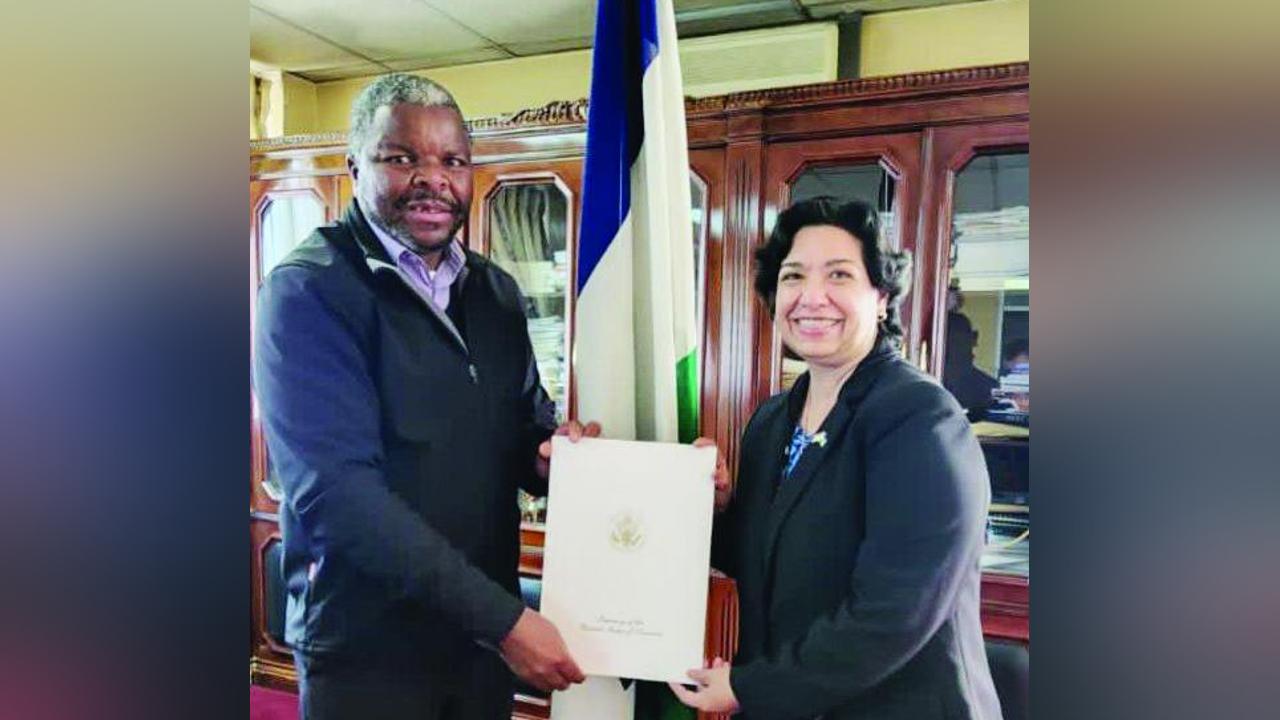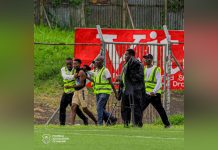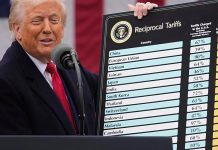Africa-Press – Lesotho. Home affairs minister, Motlalentoa Letsosa, attributes political will and determination by the current government to achievements towards eliminating trafficking in persons.
The US this week upgraded Lesotho to the Tier II list of countries in its annual report on human trafficking, noting that the country does not fully meet the minimum standards for its elimination of human trafficking even though it is making progress.
Tier II is for those countries whose governments do not fully meet the Trafficking Victims Protection Act’s (TVPA) minimum standards but are making significant efforts to comply with those standards.
The TVPA is a US Congressional legislation that requires an annual report from the state department on the status of human trafficking in countries across the world. There are more than 90 countries in Tier II.
The Annual Trafficking in Persons Report was released on Tuesday this week and presented to Letsosa as the relevant minister by the US Ambassador to Lesotho Maria Brewer.
In its Lesotho section of the report, the US state department noted that the Lesotho government launched its national action plan and allocated funding for implementation; finalized and implemented guidelines for victim identification and referral to care; and increased its anti-trafficking training and awareness-raising efforts for law enforcement, diplomats, and the public.
However, the report highlighted that the Lesotho government did not meet the minimum standards in keys including investigations and prosecution from the previous reporting period, including cases of alleged official involvement in human trafficking.
“However, the government did not meet the minimum standards in several key areas. Several investigations and prosecutions from the previous reporting period, including cases of alleged official complicity, were still pending.
“The government did not amend existing laws that created jurisdictional issues that prevent magistrate courts from issuing the maximum penalty for trafficking crimes,” reads the report.
Commenting on the upgrade Letsosa pointed out that due to his ministry’s determination, and that of sectors that supported them, Lesotho was able to make efforts in combating human trafficking, as a result the country was promoted to Tier II by the US government.
He said, among others, the ministry prioritised educating state officials including those in migration, police sector, the labour ministry as well as the general public. The officials were drilled on trafficking in persons so that they can be able to identify signs of human trafficking at an early stage.
He said this is one of the strongest and most important prevention measures that has seen the country being able to arrest human trafficking perpetrators and rescue victims.
“I say political will is all that took us this far because all the people we trained and we are working together with have been here all along but will and determination to eliminate trafficking in persons lacked,” Letsosa noted.
Lesotho’s efforts are reported to be even more significant considering the impact of the Covid-19 pandemic on its anti-trafficking capacity and compared to its previous reporting period. These include the country’s efforts to identify more trafficking victims and increase investigations and prosecutions.
The report further stated that Lesotho government continued to rely on one NGO to provide all services to trafficking victims in the country with nascent government funding, and shelter options remained limited.
The government has, among others, prioritised US government’s recommendations on addressing issues of human trafficking which include but are not limited to convicting traffickers, including officials complicit in trafficking crimes, and impose sufficiently stringent penalties.
As per the report, also prioritised are amendment of the Subordinate Court Act to fix jurisdictional issues preventing magistrate’s courts from issuing the maximum penalty for trafficking crimes.
“The government has also adequately funded the Anti-Trafficking and Migrant Control Unit and established focal points with training on human trafficking investigations for all the 10 districts of Lesotho to ensure effective responsiveness to all potential trafficking cases.
It has prioritised to institutionalise specialised trafficking in persons training to police investigators, prosecutors, magistrates, judges, immigration officials, social service personnel, and health care professionals,” the report notes.
The government of Lesotho, in its effort to eliminate trafficking in persons, has been reported to have prioritised to fully fund the Victim of Trafficking Trust Fund, establish reporting requirements for transparency, and ensure appropriate allocations for victim protection, including shelter.
It has also been reported to have established a confidential human trafficking hotline for victims to access referrals to services and to facilitate reports of human trafficking, including official complicity.
In terms of prosecution, the report states that the Lesotho government has increased anti-trafficking law enforcement efforts. However, it highlighted that serious allegations of official complicity in trafficking remained significant.
“The 2011 Anti-Trafficking in Persons Act, as amended, criminalised labor trafficking and sex trafficking.
The law prescribed penalties of up to 25 years’ imprisonment for the trafficking of adults and up to life imprisonment for the trafficking of children.
These penalties were sufficiently stringent and, with regard to sex trafficking, commensurate with penalties prescribed for other serious crimes, such as rape.
“The government initiated 10 investigations into potential human trafficking – five for labor trafficking and five for unspecified exploitation – and continued three investigations from previous reporting periods, compared with four investigations initiated during the previous reporting period,” the report noted.
It acknowledges the government’s prosecution of 16 trafficking cases, compared with four previously, as well as the conviction of one trafficker, which is the same as the previous reporting period. It says of the 16 prosecutions, six cases involved forced labour, and 10 cases involved sex trafficking – all of which involved Basotho victims.
Also achieved by the government as stated in the report, is the conviction and sentencing of one trafficker to 10 years in prison and a fine, further stating that the sentence was, however, suspended on condition that the trafficker returns to their home country within two months of release.
The report states that as much as the government has achieved much in terms of eliminating trafficking in persons, for the seventh consecutive year, it did not address a jurisdictional issue of impeding efforts to hold traffickers accountable, although officials drafted and submitted to parliament an amendment to the Subordinate Court Act, which would address the issue, but it remained pending approval at the end of the reporting period.
It notes that the magistrate courts, which are the court of first instance for trafficking cases, lacked authority to impose the maximum penalties allowed in trafficking crimes.
It reads that for a majority of the reporting period, courts adopted an abbreviated schedule due to pandemic-related public health restrictions. However, they continued to hear cases and introduced online hearings to continue deliberations without physical attendance at court houses.
“Additionally, due to a shortage of magistrates and a large backlog of criminal cases, only three magistrates were assigned to hear trafficking cases,” the report. However, of concern to the US government is corruption and official involvement in trafficking crimes.
As per the report, two investigations into officials allegedly complicit in trafficking-related offenses, initiated in the previous reporting period, remained ongoing and have not been completed to date.
Lesotho has also been reported to have increased victim identification and protection efforts. It is said to have identified 24 trafficking victims, including 10 labor trafficking victims and 14 sex trafficking victims, compared with two victims during the previous reporting period. In terms of prevention, the government has been reported to have increased anti-trafficking prevention efforts.
“The prime minister’s cabinet subcommittee to combat trafficking in persons convened regularly – setting the agenda for the government’s anti-trafficking efforts – and launched the National Strategic Framework and Action Plan (NFSAP) to Combat Trafficking in Persons for 2021-2026, with assistance from international partners.
“The NSFAP provided a roadmap for anti-trafficking efforts that delineated responsibilities among government ministries and included dedicated resources for implementation.
“The government’s multi-sectoral committee (MSC), led by MHA and charged with implementing the government’s anti-trafficking efforts, met regularly in Maseru and held additional meetings across the country with support from an international organization,” notes the report.
For More News And Analysis About Lesotho Follow Africa-Press






